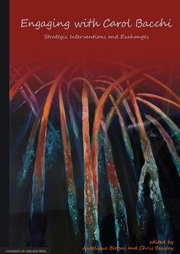Book contents
- Frontmatter
- Contents
- Acknowledgements
- List of Contributors
- Introduction
- Part I Looking back: On beginning
- Part II Strategic interventions and exchanges: Reflections and applications of the ‘What's the Problem Represented to be?’ approach
- Part III Strategic exchanges: The wider context
- 8 Making politics fleshly: The ethic of social flesh
- 9 Post-structural comparative politics: Acknowledging the political effects of research
- Part IV Looking forward: Still engaged
8 - Making politics fleshly: The ethic of social flesh
from Part III - Strategic exchanges: The wider context
Published online by Cambridge University Press: 05 June 2013
- Frontmatter
- Contents
- Acknowledgements
- List of Contributors
- Introduction
- Part I Looking back: On beginning
- Part II Strategic interventions and exchanges: Reflections and applications of the ‘What's the Problem Represented to be?’ approach
- Part III Strategic exchanges: The wider context
- 8 Making politics fleshly: The ethic of social flesh
- 9 Post-structural comparative politics: Acknowledging the political effects of research
- Part IV Looking forward: Still engaged
Summary
Introduction
In this chapter we (Chris and Carol) consider the genesis of the concept of ‘social flesh’, our imaginative reconceptualisation of social space and social relations. This concept emerged from a close working partnership over several years and from a series of joint publications. Here we trace the stages in the development of our ideas, moving specifically from queries about the disjunction between theories of citizenship and embodiment to exploration of how the concept ‘social flesh’ produces new ways of thinking about a range of pressing contemporary political issues. Specifically we offer the concept as a counter to the currently hegemonic ethic of neo-liberal ‘man’.
We aim to articulate explicitly our conceptual trajectory, outlining in a step by step fashion how we developed the notion of social flesh. The chapter provides a chronological and accretive account of the way in which we moved, partially in response to personal experiences, through a series of literatures consequent upon our concern to challenge the neo-liberal (presumptive masculine) ‘individual’. In the process of outlining this trajectory, we discuss the difficulties we found in the scholarship associated respectively with mainstream and feminist writings on citizenship, literature attending to community and social interconnection including those referring to trust and care, the body of work dealing with democratic theory, and finally analytical materials focussed upon social movements and socio-political change. This sequential critique of existing literatures works towards the assembling of a constructive alternative framework. Moreover, the identification of factors—involving intersecting personal, emotional, bodily, intellectual and professional elements—which shaped this conceptual trajectory, also provides a contribution to an ethnography of research practices.
- Type
- Chapter
- Information
- Engaging with Carol BacchiStrategic Interventions and Exchanges, pp. 99 - 120Publisher: The University of Adelaide PressPrint publication year: 2012
- 18
- Cited by



